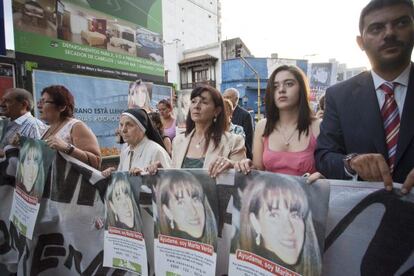The women forced into sex slavery
Brave mother leads campaign against Argentinean prostitution mafias


Susana Trimarco was a government worker in Tucumán, and was married and with two children. Her life changed almost 10 years ago, when her daughter, María de los Ángeles Verón, 23, the mother of a three-year-old, was kidnapped on a street in broad daylight.
Trimarco grew frustrated with the police, who didn't show any interest in finding out what had happed to "Marita," as she called her. After embarking on her own search, Trimarco soon discovered a secret and horrifying world of gangs in Argentina, who recruit women against their will and force them into sexual slavery.
This brave mother went underground, disguising herself as a prostitute and visiting a number of brothels in the Argentinean capital. It was there that she discovered that Marita had had another baby, fathered by one of her captors.
With the help of a Catholic nun from Marita's school, Trimarco began organizing a series of public demonstrations to demand her daughter's return. The swelling protest made national news, and the media began their own discoveries as to the extent of sex slavery in Argentina.
In 2007, Congress passed stronger laws against sexual exploitation. The Spanish Embassy also tried to help Trimarco when she discovered that Marita may have been brought to Spain to work as a prostitute in 2009.
Through the creation of a foundation that helps women who have been sexually exploited, Trimarco has been able to save about 200 victims - but she has still not been able to locate her own daughter.
Nevertheless, she garnered national attention when she took the stand at a trial against 13 defendants - eight men and five women - who have been charged in connection with the kidnapping. It is the first trial to be held against a sex trafficking ring in Argentina.
"You don't know what suffering is until you learn that they raped and stabbed your daughter, and forced her to have a baby," she told the court in San Miguel de Tucumán. Trimarco believes that more people should be charged in the disappearance, including the former president and member of the local soccer team, Rubén Ale.
One of the defendants, Daniela Milhein, told the court that Ale forced her into prostitution when she was 16 years old. "On a regular day, you don't stop working because you have to service customers 24 hours a day, whether you are on your period or you are sick," she said.
More than 600 women in Argentina are still classed as missing and are thought to be victims of slave rings, according to Fabiana Túñez, general director of the civic association La Casa del Encuentro, which was set up to prevent these type of crimes.
At least half of the women are juveniles and are captured through deceit or threats. Many of them are sent to work in Spain, Mexico or Switzerland, according to police sources.
Police look at reported disappearances on a case-by-case basis. Girls suspected as being victims of sex trafficking rings usually disappear one day without taking their belongings, and later text their parents to say that they are OK and have found jobs in other cities. The family calls the cellphone, but there is no answer, and then days later the phone is disconnected. The first 10 to 15 days in captivity are the most violent - the girls are beaten, raped and drugged, and warned that their families will be in great danger if they do not cooperate, according to Túñez. Sometimes they are sold to other trafficking rings for anywhere between 12,000 and 26,000 euros, and are taken abroad to work in Mexico, Europe or China.
"The women can come and go and do what they please but they cannot escape the brothels because they have debts with the owners. They are never allowed to be alone. Sometimes the police are working alongside these rings," Túñez says.
When Trimarco honed in on a brothel where she believed Marita was working, the local Rioja province police raided the place only to discover that Marita had been taken away just a few hours beforehand, according to testimony from other women who have been freed.
Last year, 1,597 women in Argentina were freed from sex trafficking organizations, the country's Justice Ministry reports. That figure has tripled from the 569 who were liberated the year before.
"The people who are normally arrested have a supervisory role but they are never the leaders of the rings, who usually own numerous brothels because, if they don't, their numbers [profits] won't add up," says Túñez.
Tu suscripción se está usando en otro dispositivo
¿Quieres añadir otro usuario a tu suscripción?
Si continúas leyendo en este dispositivo, no se podrá leer en el otro.
FlechaTu suscripción se está usando en otro dispositivo y solo puedes acceder a EL PAÍS desde un dispositivo a la vez.
Si quieres compartir tu cuenta, cambia tu suscripción a la modalidad Premium, así podrás añadir otro usuario. Cada uno accederá con su propia cuenta de email, lo que os permitirá personalizar vuestra experiencia en EL PAÍS.
¿Tienes una suscripción de empresa? Accede aquí para contratar más cuentas.
En el caso de no saber quién está usando tu cuenta, te recomendamos cambiar tu contraseña aquí.
Si decides continuar compartiendo tu cuenta, este mensaje se mostrará en tu dispositivo y en el de la otra persona que está usando tu cuenta de forma indefinida, afectando a tu experiencia de lectura. Puedes consultar aquí los términos y condiciones de la suscripción digital.








































